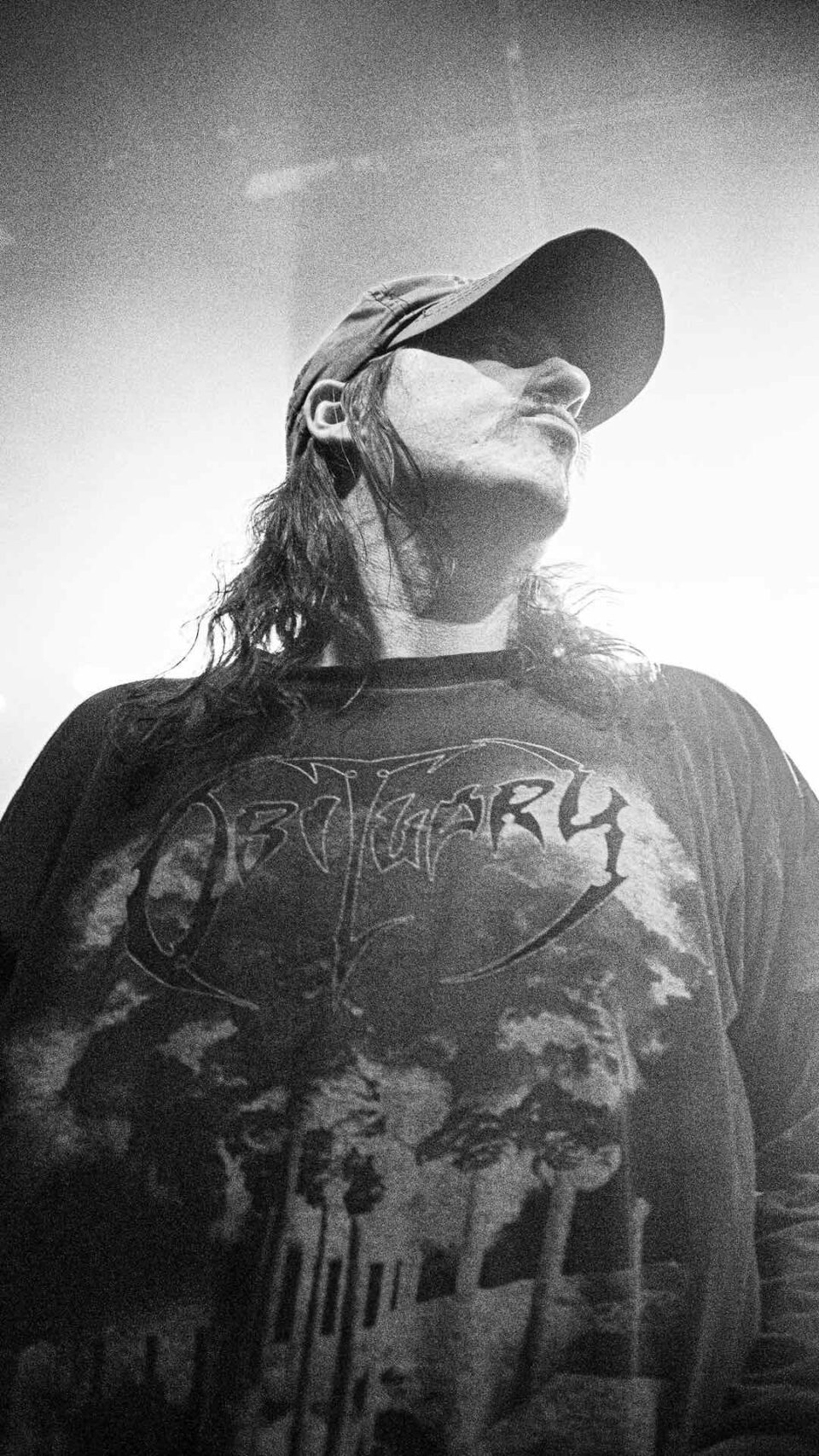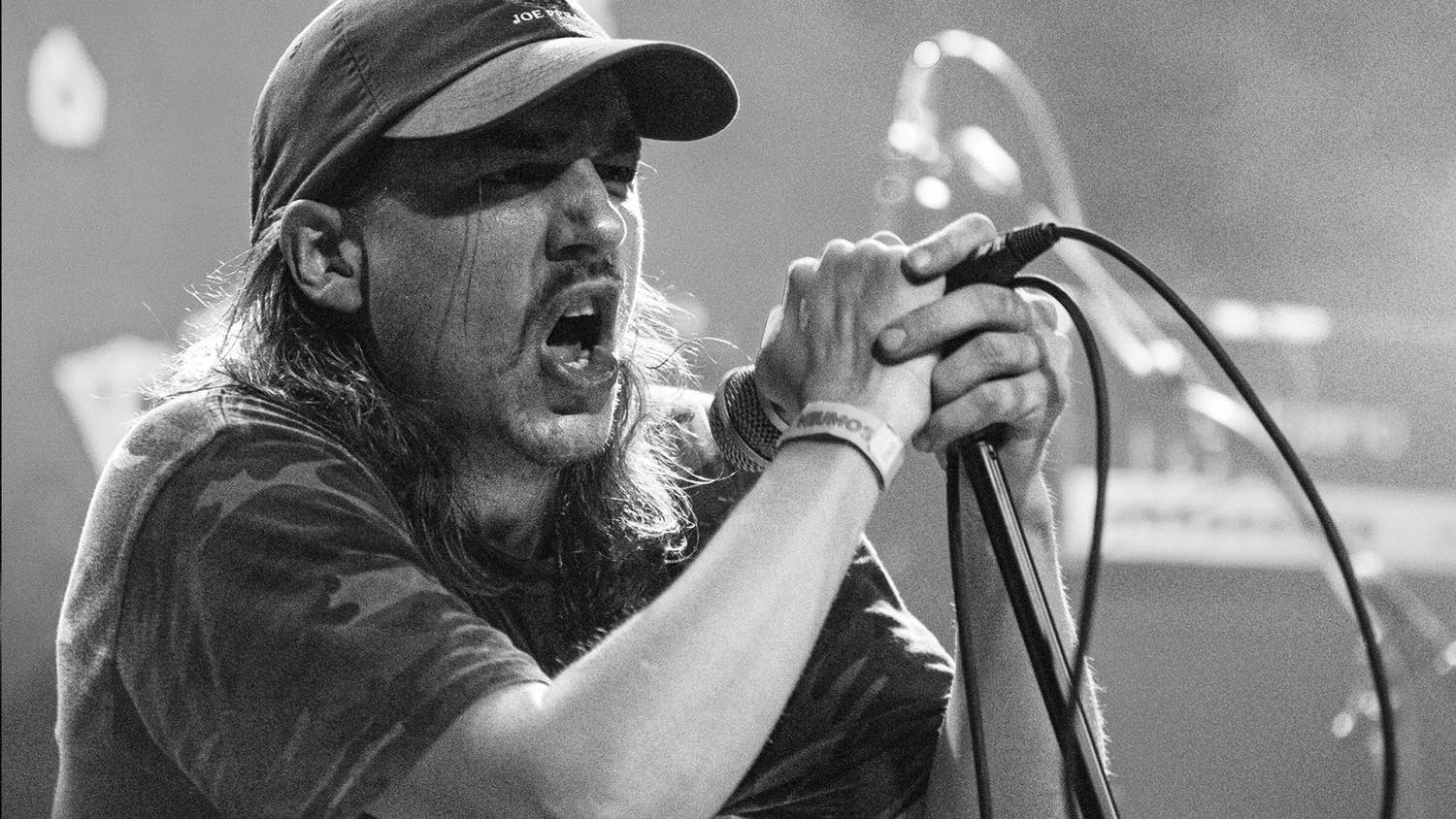“You’ve got this life, go for
whatever you wanna go for.
There are so many people in this
world, and everything moves so fast.
You might as well just live your
life the way you want to.”
— Riley Gale
When Riley Gale died from an accidental fentanyl overdose on August 24, 2020, those of us who knew him and his band—hardcore-punk and thrash-revivalists Power Trip—fell into a particularly deep despair. Little did we know how much more there was to celebrate about the life of Riley.
At the time, Power Trip was on their way to becoming a generationally important heavy music band. The Dallas group’s landmark 2017 album Nightmare Logic had already become one of the decade’s most quintessential hardcore-punk entries—thanks in large part to its already-classic anthem “Executioner’s Tax (Swing of the Axe).” With long hair and an amusing ’stache, Riley became the face of Power Trip, unleashing Gale-force screams beneath his ubiquitous brim-low cap.
Metal and punk diehards donned new Power Trip or Riley Gale tattoos when he passed away at age 34, the ink on them still as fresh as his everlasting spirit. But as we came to discover in the ensuing weeks, months, and years, Riley’s humanity ran more than skin-deep—and he wasn’t one to wear his good deeds on his sleeve. Now, three years after his death, it’s more evident than ever that Riley’s legacy is mattering just as much to those who didn’t know him personally as to those who did.
“It started really early,” Brandon Gale tells me about his late son’s capacity to love, protect, and care for marginalized individuals. Born a small fry in Dallas on April 30, 1986, Brandon reflected on Riley’s path to standing up for “the little guy.” For starters, around age six or seven, Brandon and Riley’s mom, Gina, connected him with a mentor who taught him to embrace his small stature and fight only as a last resort. “In school, he had no fear,” Brandon recalls. “If there was any bullying going on, he felt responsible for sticking up for the kids who weren’t part of the popular group.”
“In school, he had no fear. If there was any bullying going on, he felt responsible for sticking up for the kids who weren’t part of the popular group.” — Brandon Gale, Riley’s father
Witnessing his integrity in action, “people gravitated toward him,” his dad says. “He’d walk up to a group of people and become their buddies. He could move from one clique to the other: the stoners, the jocks, the nerds…he could fit in with all of them.” It certainly helped that Riley found encouragement in remarkably loving parents. “Riley’s mom and I tried to instill that sense of community in our children,” Brandon says. “I saw a single mother and two kids panhandling on the street one day, one with severe mental challenges, and we adopted them as our own.” (“We ‘adopted’ them in the context that we got them food, housing, medical care, etc.“ he later clarifies over email. “After a couple of months, they disappeared one day with no message. It was an experience that Riley and his siblings learned from.”)
Riley found even more positive reinforcement of these values when his parents sent him to Catholic school, which many kids would take as a punishment. He attended St. Paul Catholic School in Richardson and Jesuit College Preparatory School of Dallas, learning the tenets of social justice, self-reflection, humility, solidarity, and love. Riley reflected positively on his experience at Jesuit College in a 2014 interview with its school newspaper. “I think Jesuit has a very positive environment…[influencing the] defense of people who are being picked on,” Riley said. “I absolutely credit my high school experience to where I’m at.”

“People would approach me and say, ‘I was the guy or the girl that no one gave any attention to. Riley was the first person to bring me into the circle, make me feel like I have a voice.’” — Brandon Gale
Brandon—who didn’t know at the time that Riley was simultaneously sneaking out to metal shows—remembers how much his son enjoyed helping people at soup kitchens with his younger brother, Zach. “He learned to take care of people who maybe didn’t have a shot,” he says. “At one point, a friend of Riley’s was transitioning, and he said he wanted to do something to help. He took that philosophy on the road with him.” Even so, Riley’s father—who saw Power Trip play more than 100 times—says he “didn’t realize how much he was…using the band to [deliver] his message to people. People would approach me and say, ‘I was the guy or the girl that no one gave any attention to. Riley was the first person to bring me into the circle, make me feel like I have a voice.’”
Riley Gale’s family and friends know that all of these formative experiences helped mold him into the man he became—and yet none of them knew the amount of good work he was doing when not bringing joy to metalheads. Outside of his work with Power Trip, Riley carved out time to volunteer at and donate to Dallas Hope Charities (DHC), a transitional shelter with wrap-around services that focuses on helping young LGBTQ+ individuals experiencing homelessness. In step with Riley’s desire to help people most in need, LGBTQ+ people ages 18 to 24 are disproportionately vulnerable to homelessness, sex trafficking, violence, suicide, and drug addiction. According to data shared by The Trevor Project, they face a 120 percent greater risk of becoming homeless than their non-LGBTQ+ counterparts, and about 34 percent of people currently homeless in Texas’ Dallas and Collin Counties are 18 to 24 years old.
“Our first board meeting where we talked about his efforts, we were in shock. There were so many LGBTQ youth that responded to his music, and he had a large following that we weren’t even aware of.” — Roscoe Compton-Kelly, DHC board member
For the leader of an extreme-music band, it makes sense that Riley would have provided the most radical support he could to one of society’s most vulnerable populations, which he found in DHC. Riley’s embrace of the concept of humility was so strong that no one will ever know how much good work he did for the nonprofit—even DHC’s own board members. “In spring 2019, when I was board chair, our executive director said Riley had reached out to her and said his band wanted to help us,” DHC board member Roscoe Compton-Kelly recalls. “No one even knew who we were, our organization was so small at the time—and vice versa. No one has ever found out how Riley discovered us. He and our executive director decided to do a tabling event at one of his band’s concerts. When I found out it was a metal band called Power Trip, I was, like, ‘OK, well, let’s see what happens.’”
The event was a success, Compton-Kelly says, and DHC allies reported back on how much they found Riley to be “down to earth” and “giving.” “He really was genuinely curious about what we were doing in our mission and the work that we were doing with these kids,” Compton-Kelly notes, summarizing people’s initial take-aways. “He wanted to give back as much as he could, support in as many ways that he could. Our first board meeting where we talked about his efforts, we were in shock. There were so many LGBTQ youth and people that responded to his music, and he had a large following that we weren't even aware of.”


Riley’s efforts—which included a $30,000 check from the Riley Gale Foundation—turned out to be game-changers for DHC. Not only was Riley volunteering at the organization and having long conversations with clients, but he delivered critical financial support at exactly the moment DHC needed it. The board was desperately trying to establish more housing for young LGBTQ+ individuals whose families had forced them to leave their homes, and the organization’s Dallas Hope Center only consisted of four beds in a rented apartment.
“He somehow came across us, and within our organization, we still don’t know exactly how he chose to support us. But he turbocharged our efforts and doubled our capacity.” — Jason Reed, DHC Board Treasurer
According to DHC Board Treasurer Jason Reed, Power Trip started donating a portion of its proceeds from ticket sales directly to the Center in January 2020. “We bought a house in November 2020 and doubled our capacity and expanded our staffing. I don’t know that we would have had the courage to do that without knowing that there was some support coming from Riley. All of this came from Riley—there was no reaching out by us to him, initially. He somehow came across us, and within our organization, we still don’t know exactly how he chose to support us. But he turbocharged our efforts and doubled our capacity.”
Thanks to Riley and Power Trip’s contributions, DHC acquired not just the house—which now has eight beds—but also built a library that’s named after him and contains nearly a thousand books. Memorials of Gale are inside, including a pair of his Converse sneakers, capturing both his legacy as a powerhouse metal vocalist and a loving advocate for those most in need of help. Reed noted that, to this day, the financial contributions by Riley, Power Trip, their fans, and other related efforts—including a tribute charity single by other metal bands released earlier this year—have amounted to more than $100,000. But, as Reed insists: “He didn’t try to drive publicity to himself or the band through this. I truly think it was a gift of the heart from Riley.”


In August 2019, Riley reflected to me on the success of “Executioner’s Tax (Swing of the Axe),” saying in an interview that he knew when the band recorded it that the cut would be popular. “It now has almost three million plays on Spotify, which is fucking crazy,” he said of the song at the time. “A lot of people nominated it as song of the year. I don’t know if I can write a song better than that. It can only go downhill from here.”
Riley’s humility shone through in those comments—and very well may have distracted from the talent he and his band had to write even stronger material in the future. But while Gale’s career as a musician ended three years ago, his vocation—championing marginalized individuals—lives on. If only Riley knew that it wasn’t going to be downhill from there—not if he saw the faces of those whose lives he changed through his combined works of justice and charity.
“I didn’t know how many lives he touched until he was gone,” adds Riley’s father, sobbing. “I am so proud of him.” FL







